Impact of Climate Change on the Preferred Season for Outdoor Water Activities
Abstract
:1. Introduction
2. Methods
2.1. Study Sites
2.2. Data and Analysis
3. Results
3.1. Preferred Weather Conditions for Outdoor Water Activities
3.2. Projected Changes in the Season for Outdoor Water Activities
4. Discussion and Conclusions
Acknowledgments
Author Contributions
Conflicts of Interest
References
- Gómez Martín, M.B. Weather, climate and tourism a geographical perspective. Ann. Tour. Res. 2005, 32, 571–591. [Google Scholar] [CrossRef]
- Gössling, S.; Scott, D.; Hall, C.M.; Ceron, J.P.; Dubois, G. Consumer behaviour and demand response of tourists to climate change. Ann. Tour. Res. 2012, 39, 36–58. [Google Scholar] [CrossRef]
- Kim, S.; Park, J.H.; Lee, D.K.; Son, Y.; Yoon, H.; Kim, S.; Yun, H.J.; Kim, S.; Park, J.H.; Lee, D.K.; et al. The impacts of weather on tourist satisfaction and revisit intention: A study of South Korean domestic tourism. Asia Pac. J. Tour. Res. 2017, 22, 895–908. [Google Scholar] [CrossRef]
- Schott, C. Tourism and the Implications of Climate Change: Issues and Actions; Emerald Group Publishing Limited: Bingley, UK, 2010. [Google Scholar]
- De Freitas, C.R. Tourism climatology: Evaluating environmental information for decision making and business planning in the recreation and tourism sector. Int. J. Biometeorol. 2003, 48, 45–54. [Google Scholar] [CrossRef] [PubMed]
- Intergovernmental Panel on Climate Change (IPCC). Cliamte Change 2013: The Physical Science Basis; Cambridge University Press: Cambridge, UK, 2013. [Google Scholar]
- Scott, D.; McBoyle, G.; Schwartzentruber, M. Climate change and the distribution of climatic resources for tourism in North America. Clim. Res. 2004, 27, 105–117. [Google Scholar] [CrossRef]
- Buzinde, C.N.; Manuel-Navarrete, D.; Yoo, E.E.; Morais, D. Tourits’ perceptions in a cliamte of change: Eroding destinations. Ann. Tour. Res. 2010, 37, 333–354. [Google Scholar] [CrossRef]
- Weaver, D. Can sustainable tourism survive climate change? J. Sustain. Tour. 2011, 19, 5–15. [Google Scholar] [CrossRef]
- Scott, D.; Hall, C.M.; Stefan, G. Tourism and Climate Change: Impacts, Adaptation and Mitigation; Routledge: Abingdon, UK, 2012. [Google Scholar]
- United Nations World Tourism Organization (UNWTO); United Nations Environment Programme (UNEP). Climate Change and Tourism: Responding to Global Challenges; United Nations World Tourism Organization (UNWTO): Madrid, Spain, 2008. [Google Scholar]
- De Freitas, C.R.; Scott, D.; McBoyle, G. A second generation climate index for tourism (CIT): Specification and verification. Int. J. Biometeorol. 2007, 52, 399–407. [Google Scholar] [CrossRef] [PubMed]
- Becker, S. Beach comfort index—A new approach to evaluate the thermal conditions of beach holiday resorts using a South African example. GeoJournal 1998, 44, 297–307. [Google Scholar] [CrossRef]
- Scott, D.; Gössling, S.; de Freitas, C.R. Preferred climates for tourism: Case studies from Canada, New Zealand and Sweden. Clim. Res. 2008, 38, 61–73. [Google Scholar] [CrossRef]
- Morgan, R.; Gatell, E.; Junyent, R.; Micallef, A.; Özhan, E.; Williams, A.T. An improved user-based beach climate index. J. Coast. Conserv. 2000, 6, 41–50. [Google Scholar] [CrossRef]
- Ibarra, E.M. The use of webcam images to determine tourist-climate aptitude: Favourable weather types for sun and beach tourism on the Alicante coast (Spain). Int. J. Biometeorol. 2011, 55, 373–385. [Google Scholar] [CrossRef] [PubMed]
- Moreno, A.; Amelung, B. Climate change and tourist comfort on Europe’s beaches in Summer: A Reassessment. Coast. Manag. 2009, 37, 550–568. [Google Scholar] [CrossRef]
- Amelung, B.; Viner, D. Mediterranean tourism: Exploring the future with the tourism climatic index. J. Sustain. Tour. 2006, 14, 349–366. [Google Scholar] [CrossRef]
- Alegre, J.; Garau, J. The factor structure of tourist satisfaction at sun and sand destinations. J. Travel Res. 2011, 50, 78–86. [Google Scholar] [CrossRef]
- Korea Employers Federation. 2016 Survey on Summer Vacation; Korea Employers Federation: Seoul, Korea, 2016. [Google Scholar]
- Moreno, A.; Amelung, B.; Santamarta, L. Linking beach recreation to weather conditions: A Case study in Zandvoort, Netherlands. Tour. Mar. Environ. 2008, 5, 111–119. [Google Scholar] [CrossRef]
- Rutty, M.; Scott, D. Thermal range of coastal tourism resort microclimates. Tour. Geogr. 2014, 16, 346–363. [Google Scholar] [CrossRef]
- Yu, G.; Walsh, J.E. A weather-resolving index for assessing the impact of climate change on tourism related climate resources. Clim. Chang. 2009, 95, 551–573. [Google Scholar] [CrossRef]
- Thom, E.C. The Discomfort Index. Weatherwise 1959, 12, 57–61. [Google Scholar] [CrossRef]
- Carolli, M.; Zolezzi, G.; Geneletti, D.; Siviglia, A.; Carolli, F.; Cainelli, O. Science of the Total Environment Modelling white-water rafting suitability in a hydropower regulated Alpine River. Sci. Total Environ. 2017, 579, 1035–1049. [Google Scholar] [CrossRef] [PubMed]
- Joo, H.H.; Kang, H.-G.; Moon, J.J. The effect of rain on the decision to visit a theme park. Asia Pac. J. Tour. Res. 2012, 19, 61–85. [Google Scholar] [CrossRef]
- Cohen, J. Statistical Power Analysis for the Behavioral Sciences, 2nd ed.; Lawrence Erlbaum: Mahwah, NJ, USA, 1998. [Google Scholar]
- Ferguson, C.J. An effect size primer: A guide for clinicians and researchers. Prof. Psychol. Res. Pract. 2009, 40, 532–538. [Google Scholar] [CrossRef]
- Njoroge, J.M. Climate change and tourism adaptation: Literature review. Tour. Hosp. Manag. 2015, 21, 95–108. [Google Scholar]
- Iso-ahola, S.E. A theory of substitutability of leisure behavior A Theory of Substitutability of Leisure Behavior. Leis. Sci. 1986, 8, 367–389. [Google Scholar] [CrossRef]
- Becken, S.; Wilson, J. The impacts of weather on tourist travel. Tour. Geogr. 2013, 15, 620–639. [Google Scholar] [CrossRef]
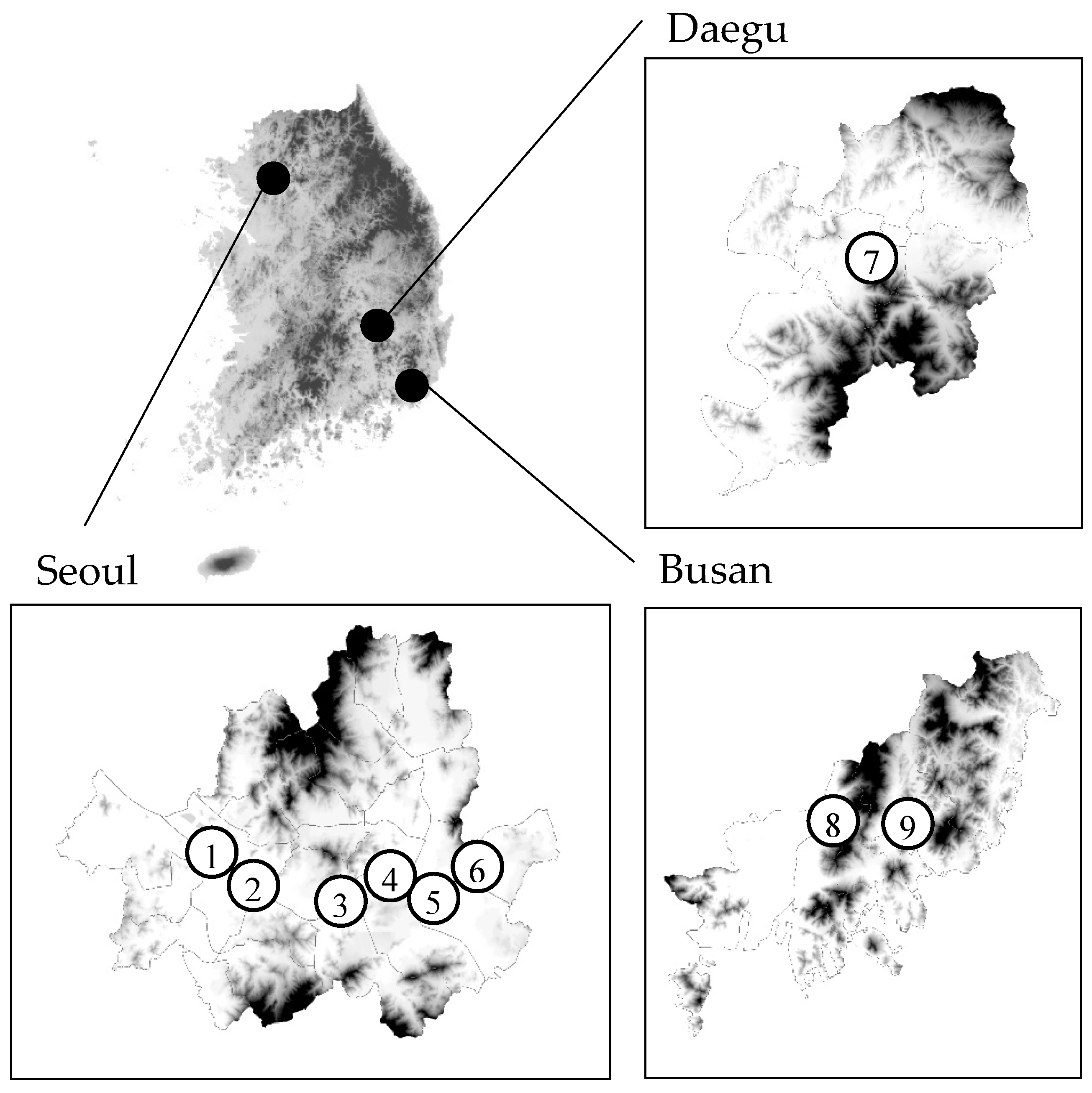
| Temperature-Mean (°C) a) | Temperature-Max (°C) a) | Discomfort Index-Mean b) | Discomfort Index-Max b) | Precipitation (mm) a) | Number of Tropical Nights a) | |
|---|---|---|---|---|---|---|
| Seoul | 25.57 | 29.18 | 75.11 | 80.62 | 20.70 | 8.8 |
| Daegu | 26.76 | 31.30 | 76.47 | 83.26 | 14.50 | 16.7 |
| Busan | 25.40 | 28.53 | 75.29 | 80.22 | 18.78 | 14.2 |
| City | Outdoor Swimming Pools | Area a) (m2) | Capacity a) (Persons) | Ticket Price b) (KRW) | Number of Visitors b) (Persons) | ||
|---|---|---|---|---|---|---|---|
| Max | Mean | Min | |||||
| Seoul | Yeouido | 20,000 | 3600 | 5000 | 8795 | 1429 | 14 |
| Ttukseom | 21,000 | 3500 | 5000 | 10,534 | 2571 | 13 | |
| Mangwon | 23,493 | 3300 | 5000 | 7412 | 1215 | 11 | |
| Gwangnaru | 9630 | 1200 | 5000 | 2519 | 530 | 11 | |
| Jamsil | 27,945 | 3400 | 5000 | 2353 | 536 | 13 | |
| Jamwon | 23,325 | 3000 | 5000 | 1946 | 485 | 12 | |
| Daegu | Dooryu | 3625 c) | 5500 | 5000 | 2773 | 894 | 18 |
| Busan | Hwamyung | 9966 | 5000 | 4000 | 4980 | 1448 | 40 |
| Onchenonchen | 210 c) | 200 | 0 | 1300 | 451 | 50 | |
| Climate Factors | Seoul a) | Daegu b) | Busan c) |
|---|---|---|---|
| Gathered data (a) | 1384 | 300 | 217 |
| Weekend and national holidays (b) | 376 | 87 | 58 |
| First week of August (c) | 104 | 24 | 21 |
| June and September (d) | 112 | 32 | 42 |
| Used data (a-b-c-d) | 792 | 157 | 96 |
| Seoul | Daegu | Busan | |||||||||||
|---|---|---|---|---|---|---|---|---|---|---|---|---|---|
| Temperature (°C) (Increased Points) | Precipitation (mm) (Increased Points) | Temperature (°C) (Increased Points) | Precipitation (mm) (Increased Points) | Temperature (°C) (Increased Points) | Precipitation (mm) (Increased Points) | ||||||||
| Present | 29.18 | 20.70 | 31.30 | 14.50 | 28.53 | 18.78 | |||||||
| RCP 2.6 | 2030s | 30.80 | (1.62) | 13.49 | (−7.21) | 31.09 | (−0.21) | 12.89 | (−1.61) | 30.22 | (1.69) | 12.37 | (−6.41) |
| 2060s | 30.81 | (1.63) | 11.57 | (−9.13) | 31.20 | (−0.10) | 12.26 | (−2.24) | 30.28 | (1.75) | 12.28 | (−6.50) | |
| 2090s | 31.43 | (2.25) | 11.63 | (−9.07) | 31.90 | (0.60) | 13.39 | (−1.11) | 31.05 | (2.52) | 11.50 | (−7.28) | |
| RCP 4.5 | 2030s | 31.51 | (2.33) | 12.22 | (−8.48) | 31.52 | (0.22) | 15.58 | (1.08) | 30.21 | (1.68) | 18.02 | (−0.76) |
| 2060s | 30.66 | (1.48) | 15.96 | (−4.74) | 31.31 | (0.01) | 16.70 | (2.20) | 30.32 | (1.79) | 19.50 | (0.72) | |
| 2090s | 32.56 | (3.38) | 13.59 | (−7.11) | 32.52 | (1.22) | 13.55 | (−0.95) | 31.20 | (2.67) | 14.87 | (−3.91) | |
| RCP 6.0 | 2030s | 30.18 | (1.00) | 14.71 | (−5.99) | 30.00 | (−1.30) | 15.40 | (0.90) | 28.80 | (0.27) | 16.09 | (−2.69) |
| 2060s | 31.00 | (1.82) | 14.83 | (−5.87) | 31.88 | (0.58) | 12.74 | (−1.76) | 30.45 | (1.92) | 14.50 | (−4.28) | |
| 2090s | 33.26 | (4.08) | 12.57 | (−8.13) | 33.42 | (2.12) | 14.94 | (0.44) | 31.94 | (3.41) | 18.56 | (−0.22) | |
| RCP 8.5 | 2030s | 30.62 | (1.44) | 13.52 | (−7.18) | 30.86 | (−0.44) | 13.29 | (−1.21) | 29.75 | (1.22) | 15.52 | (−3.26) |
| 2060s | 32.64 | (3.46) | 13.66 | (−7.04) | 32.97 | (1.67) | 14.89 | (0.39) | 31.62 | (3.09) | 14.63 | (−4.15) | |
| 2090s | 34.89 | (5.71) | 14.30 | (−6.40) | 35.13 | (3.83) | 15.97 | (1.47) | 33.16 | (4.63) | 20.50 | (1.72) | |
| Seoul | |||
| Temperature | Discomfort Index | Precipitation | |
| Z-score of number of visitors | 0.512 *** | 0.466 *** | −0.338 *** |
| Temperature | - | 0.940 *** | −0.098 |
| Discomfort index | - | - | 0.056 |
| Daegu | |||
| Temperature | Discomfort index | Precipitation | |
| Z-score of number of visitors | 0.397 *** | 0.384 *** | −0.429 *** |
| Temperature | - | 0.942 *** | −0.275 |
| Discomfort index | - | - | −0.211 |
| Busan | |||
| Temperature | Discomfort index | Precipitation | |
| Z-score of number of visitors | 0.448 *** | 0.345 *** | −0.271 *** |
| Temperature | - | 0.506 *** | −0.300 |
| Discomfort index | - | - | 0.173 |
| Climate Factors | Model | Seoul | Daegu | Busan |
|---|---|---|---|---|
| Temperature | Linear | 0.25 | 0.15 | 0.20 |
| Quadratic | 0.25 | 0.16 | 0.22 | |
| Cubic | 0.27 | 0.19 | 0.27 | |
| Precipitation | Linear | 0.11 | 0.10 | 0.15 |
| Log | 0.11 | 0.14 | 0.16 |
| Data | Seoul | Daegu | Busan |
|---|---|---|---|
| Individual data a) | 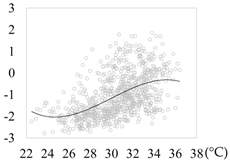 | 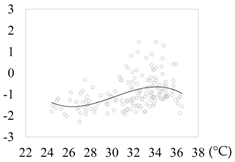 | 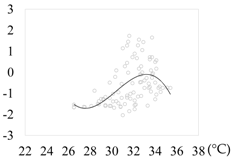 |
| (Preference function) | (R2 = 0.27) | (R2 = 0.19) | (R2 = 0.27) |
| (Inflection Points (°C)) | Low = 24.84, High 34.90 | Low = 25.53, High 35.58 | Low = 26.25, High 34.42 |
| Average Z-score of number of visitors for each degree of temperature b) | 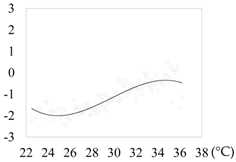 | 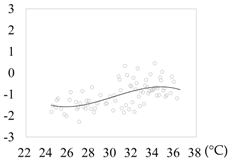 | 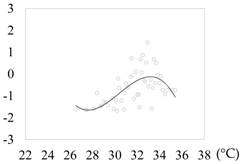 |
| (Preference function) | (R2 = 0.79) | (R2 = 0.36) | (R2 = 0.43) |
| (Inflection Points (°C)) | Low = 24.61, High 34.97 | Low = 25.54, High 35.50 | Low = 27.44, High 34.43 |
| Data | Seoul | Daegu | Busan |
|---|---|---|---|
| Individual data a) | 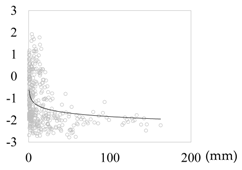 | 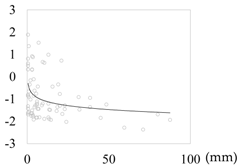 | 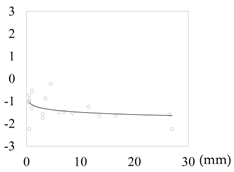 |
| (Preference function) | (R2 = 0.11) | (R2 = 0.14) | (R2 = 0.16) |
| (Stabilized Point c)) | 23.5 mm | 31.5 mm | 16.5 mm |
| Average Z-score of number of visitors for each degree of precipitation b) | 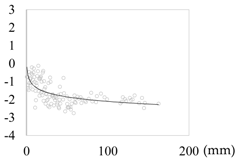 | 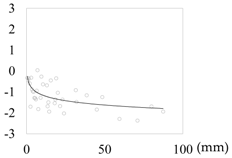 | 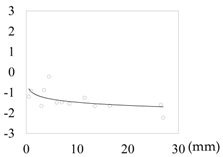 |
| (Preference function) | (R2 = 0.42) | (R2 = 0.36) | (R2 = 0.29) |
| (Stabilized Point c)) | 36.5 mm | 31.5 mm | 26.5 mm |
| Seoul | Daegu | Busan | |||||||||||
|---|---|---|---|---|---|---|---|---|---|---|---|---|---|
| Whole Season (a) | Less Desirable Days | Preferred Days (a-b-c) | Whole Season (a) | Less Desirable Days | Preferred Days (a-b-c) | Whole Season (a) | Less Desirable Days | Preferred Days (a-b-c) | |||||
| Hot (b) | Rainy (c) | Hot (b) | Rainy (c) | Hot (b) | Rainy (c) | ||||||||
| Present | 125 | 1 | 10 | 114 | 144 | 8 | 7 | 129 | 95 | 1 | 10 | 84 | |
| RCP 2.6 | 2030s | 136 | 4 | 7 | 125 | 144 | 7 | 9 | 128 | 95 | 5 | 5 | 85 |
| (8.80) | (300) | (−30) | (10) | (0) | (−13) | (29) | (−1) | (0.00) | (400) | (−50) | (1) | ||
| 2060s | 138 | 4 | 6 | 128 | 144 | 6 | 6 | 132 | 102 | 5 | 5 | 92 | |
| (10.40) | (300) | (−40) | (12) | (0) | (−25) | (−14) | (2) | (7.37) | (400) | (−50) | (10) | ||
| 2090s | 139 | 7 | 6 | 126 | 147 | 10 | 8 | 129 | 104 | 7 | 5 | 92 | |
| (11.20) | (600) | (−40) | (11) | (2) | (25) | (14) | (0) | (9.47) | (600) | (−50) | (10) | ||
| RCP 4.5 | 2030s | 140 | 12 | 5 | 123 | 149 | 13 | 7 | 129 | 105 | 8 | 8 | 89 |
| (12.00) | (1100) | (−50) | (8) | (3) | (63) | (0) | (0) | (10.53) | (700) | (−20) | (6) | ||
| 2060s | 154 | 4 | 8 | 142 | 160 | 11 | 9 | 140 | 110 | 8 | 11 | 91 | |
| (23.20) | (300) | (−20) | (25) | (11) | (38) | (29) | (9) | (15.79) | (700) | (10) | (8) | ||
| 2090s | 161 | 18 | 5 | 138 | 164 | 15 | 5 | 144 | 114 | 8 | 8 | 98 | |
| (28.80) | (1700) | (−50) | (21) | (14) | (88) | (−29) | (12) | (20.00) | (700) | (−20) | (17) | ||
| RCP 6.0 | 2030s | 135 | 4 | 6 | 125 | 139 | 2 | 8 | 129 | 105 | 1 | 7 | 97 |
| (8.00) | (300) | (−40) | (10) | (−3) | (−75) | (14) | (0) | (10.53) | (0) | (−30) | (15) | ||
| 2060s | 146 | 10 | 6 | 130 | 160 | 13 | 5 | 142 | 115 | 8 | 5 | 102 | |
| (16.80) | (900) | (−40) | (14) | (11) | (63) | (−29) | (10) | (21.05) | (700) | (−50) | (21) | ||
| 2090s | 162 | 24 | 4 | 134 | 170 | 22 | 8 | 140 | 124 | 15 | 7 | 102 | |
| (29.60) | (2300) | (−60) | (18) | (18) | (175) | (14) | (9) | (30.53) | (1400) | (−30) | (21) | ||
| RCP 8.5 | 2030s | 139 | 5 | 5 | 129 | 156 | 8 | 8 | 140 | 114 | 5 | 8 | 101 |
| (11.20) | (400) | (−50) | (13) | (8) | (0) | (14) | (9) | (20.00) | (400) | (−20) | (20) | ||
| 2060s | 148 | 20 | 6 | 122 | 168 | 20 | 7 | 141 | 128 | 14 | 6 | 108 | |
| (18.40) | (1900) | (−40) | (7) | (17) | (150) | (0) | (9) | (34.74) | (1300) | (−40) | (29) | ||
| 2090s | 173 | 46 | 7 | 120 | 187 | 41 | 10 | 136 | 147 | 30 | 10 | 107 | |
| (38.40) | (4500) | (−30) | (5) | (30) | (413) | (43) | (5) | (54.74) | (2900) | (0) | (27) | ||

© 2017 by the authors. Licensee MDPI, Basel, Switzerland. This article is an open access article distributed under the terms and conditions of the Creative Commons Attribution (CC BY) license (http://creativecommons.org/licenses/by/4.0/).
Share and Cite
Kim, S.; Park, J.H.; Lee, D.K. Impact of Climate Change on the Preferred Season for Outdoor Water Activities. Sustainability 2017, 9, 1535. https://doi.org/10.3390/su9091535
Kim S, Park JH, Lee DK. Impact of Climate Change on the Preferred Season for Outdoor Water Activities. Sustainability. 2017; 9(9):1535. https://doi.org/10.3390/su9091535
Chicago/Turabian StyleKim, Songyi, Jin Han Park, and Dong Kun Lee. 2017. "Impact of Climate Change on the Preferred Season for Outdoor Water Activities" Sustainability 9, no. 9: 1535. https://doi.org/10.3390/su9091535
APA StyleKim, S., Park, J. H., & Lee, D. K. (2017). Impact of Climate Change on the Preferred Season for Outdoor Water Activities. Sustainability, 9(9), 1535. https://doi.org/10.3390/su9091535





